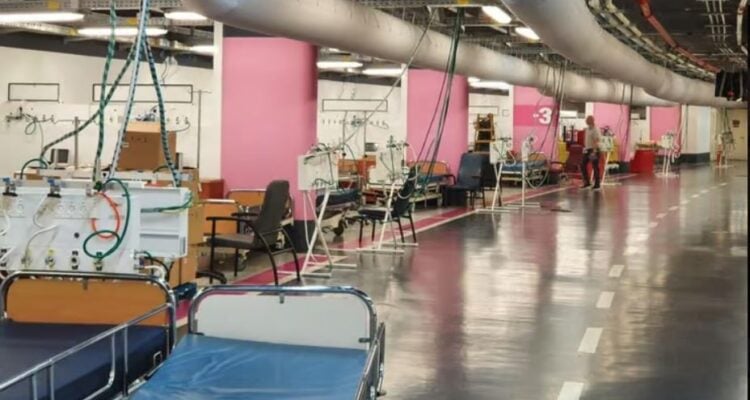The safety measures were ordered as heavy Hezbollah rocket barrages have been fired as far south as Haifa.
By Batya Jerenberg, World Israel News
All hospitals in Israel’s north are moving their patients to protected spaces and even underground as a result of the heavy rocket barrages Hezbollah has launched since very early Sunday morning.
Rambam Hospital in Haifa is shifting to its reinforced underground parking lot, which was prepared long ago with the infrastructure needed to care for patients in this alternative space.
“Due to the current escalation in the north,” said Rambam Director Prof. Michael Halbertal, “according to the orders of the Homefront Command, the hospital is preparing to deal with … Alert Level 3.”
“This means that for the first time, the whole hospital is going down” to the vast protected space,” he added, and would stay there until further notice.
The process of transferring patients, and moving all the medical equipment to the parking lot, will take 12 hours, he noted.
Halbertal made a point of saying that anyone who needs emergency care should “not hesitate” to come to the hospital, as “the emergency rooms are working as usual.”
Six other hospitals, including those in Tiberius and Nazareth, will now also operate from protective spaces until further notice.
A seventh, the Galilee Medical Center in Nahariya, had already had most of its functions based in its underground shelter for nearly a full year, since the start of the war.
The Emek Medical Center in Afula announced that its delivery rooms, which were already in reinforced areas, are operating regularly as the staff prepares to evacuate the upper floors to its underground complex.
In all the hospitals, elective and non-emergency surgeries have been canceled for now and outpatient clinics closed. They are also releasing all patients who can possibly go home.
The hospitals have trained their staff for such a situation, and all swung into action immediately upon receiving the official notice.
The Health Ministry has also been working with the northern hospitals for months to prepare them for a worst-case scenario in which each medical facility is on its own.
The ministry’s director-general, Moshe Bar Siman Tov, spoke about this just last week at a health conference.
“We know that war is the so-called kingdom of chaos, and unexpected things will happen and we’ll have to deal with things in the end that we probably haven’t faced before,” he said.
“It’s possible that the hospitals will be what we call ‘a desert island,’ disconnected, and they will be the ones who will have to make the decisions,” he continued. “We’ll help them with manpower, we’ll help them with equipment, but there will be many things here that we will really experience for the first time.”
Part of the preparations for such a situation included the stockpiling of medications and blood supplies at each medical center.
The hundreds of Hezbollah missile launches are its attempt to retaliate for the IDF assassinations over the weekend of over a dozen of the terror group’s top commanders, as well as the pager and walkie talkie explosions last week that killed more than 30 Hezbollah operatives and wounded some 3,000.




